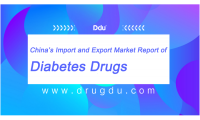-
China’s Import and Export Market Report of Diabetes Drugs
- Source: Ddu
- 49,912
- August 25, 2021
-
Ddu College——WHO vaccine pre-certification How to conduct effective consultation?
- Source: drugdu
- 1,493
- August 25, 2021
-
NICE turns down GSK’s IV Benlysta for systemic lupus
- Source: drugdu
- 317
- June 4, 2021
-
NICE green lights Tremfya to treat active psoriatic arthritis
- Source: drugdu
- 259
- May 31, 2021
-
Alchemab to collaborate with AstraZeneca on prostate cancer research
- Source: drugdu
- 369
- May 7, 2021
-
Real-world data suggests Sputnik V vaccine is 97.6% effective, says RDIF
- Source: drugdu
- 226
- April 20, 2021
-
Positive results for Pfizer/BioNTech’s COVID-19 vaccine in 12-15 year olds
- Source: drugdu
- 351
- April 2, 2021
-
GSK to leverage the Cell and Gene Therapy Catapult’s facility in Stevenage
- Source: drugdu
- 232
- March 12, 2021
-
NICE backs selective internal radiation therapy for advanced liver cancer
- Source: drugdu
- 316
- March 3, 2021
-
Novo Nordisk’s Sogroya moves closer towards EU approval
- Source: drugdu
- 256
- February 5, 2021
your submission has already been received.
OK
Subscribe
Please enter a valid Email address!
Submit
The most relevant industry news & insight will be sent to you every two weeks.











